The native folk music of Mozambique has been highly influenced by Portuguese colonisation and local language forms. The most popular style of modern dance music is marrabenta. Mozambican music also influenced another Lusophone music in Brazil, like maxixe, and mozambique style in Cuba and New York City.
Marrabenta is a popular style of Mozambican dance music combining traditional Mozambican dance rhythms with Portuguese folk music. It was developed in Maputo, the capital city of Mozambique, during the 1930s and 1940s.
Ghorwane is a Mozambican marrabenta musical band who have primarily use guitars saxophones and percussion instrument. It was founded in 1983. The band derived its name from the lake of the same name in the province of Gaza. This name was given by President Samora Machel during a festival to celebrate the ten years of independence in 1985. Samora has declared that "It's prohibited to lie in the People's Republic of Mozambique" and cites Ghorwane as an example. Ghorwane is the Shangaan term for "Good Boys". Their style is a combination of traditional Mozambique music, Afropop, and fusion. Ghorwane's music is sung in local languages, including Shangaan, Ronga and Chope. The band's composer and saxophonist, Jose "Zeca" Alage, was murdered in 1993. Their 2005 album VANA VA NDOTA was dedicated to Zeca Alage (1959–1993) and Pedro Langa (1959–2001).
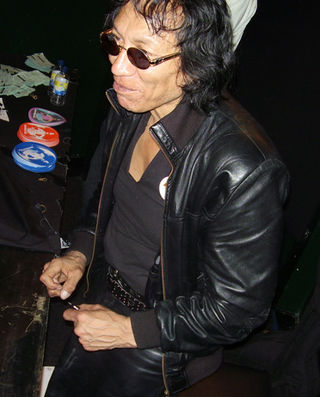
Sixto Diaz Rodriguez, mononymously known as Rodriguez, was an American musician from Detroit, Michigan.
The culture of Mozambique is in large part derived from its history of Bantu, Swahili, and Portuguese rule, and has expanded since independence in 1975. The majority of its inhabitants are black Africans. Its main language is Portuguese. Its median religion is Roman Catholicism, but only about 40% of the inhabitants are Christian. It has a rich history in the areas of arts, cuisine, and entertainment.
Kuxa Kanema: The Birth of Cinema is a 2003 documentary by Margarida Cardoso on the National Institute of Cinema (INC), created by President Samora Machel following the 1975 independence of Mozambique.

Ava Marie DuVernay is an American filmmaker, screenwriter, and producer. She is a recipient of a Primetime Emmy Award, two NAACP Image Award, a BAFTA Film Award, and a BAFTA TV Award, as well as a nominee of an Academy Award and Golden Globe. In 2011, she founded her independent distribution company ARRAY.
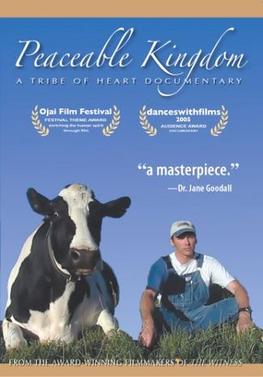
Peaceable Kingdom, produced in 2004 by Tribe of Heart, is a documentary about several farmers who refuse to kill animals and how they convert to veganism as a way of life.
Mabulu is a band from Mozambique. Their name means "looking for a dialogue" in the Shangana language - a reference to the fact that the group comprises members from different generations.
Stewart Sukuma, born Luis Pereira in 1963, is a Mozambican singer. Sukuma's stage name means "rise up" in Xitsonga and "push" in Swahili. He was born in Cuamba, Niassa Province. Coming from a modest family, Sukuma loved music; he moved to the Mozambican capital of Maputo in 1977, learning to play percussion instruments, guitar and piano. Five years later, Sukuma joined a musical group as a vocalist. He received a Ngoma Mozambique award in 1983, and has been described as "Mozambique's most popular male vocalist". Sukuma's songs include "Felizminha", "Xitchuketa Marrabenta", "Sumanga", "Male" and "Why". He sings in Portuguese, English, Swahili, Echwabo and Xitsonga.
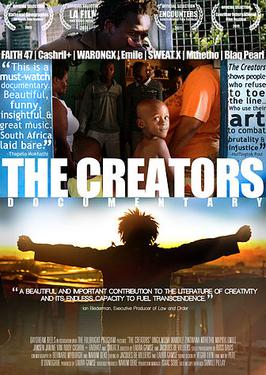
The Creators: South Africa Through the Eyes of Its Artists is a 2012 South African documentary film produced and directed by Laura Gamse which interweaves the lives of diverse South African artists including Faith47, Cashril+, Warongx, Emile Jansen of Black Noise, Markus Wormstorm and Spoek Mathambo of Sweat.X, Blaq Pearl, and Mthetho Mapoyi.

Les larmes de l’émigration is a 2010 documentary film directed by Alassane Diago.
Karen Boswall is an independent film maker, known for documentaries that she made while living and working in Mozambique between 1993 and 2007. She is a part-time lecturer in Visual Anthropology at the University of Kent. Her films cover a range of subjects that include marine conservation, popular music, women & HIV and peace and reconciliation.
Fany Pfumo was a Mozambican-born singer who was mainly active in South Africa. He is considered one of the founders and of the prominent artists in the marrabenta style scene. Born to a poor family, he started his career playing an "oil tin guitar" in Maputo's suburbs but later moved to South Africa in search of a better living. In Johannesburg, Pfumo had the opportunity to record with HMV, achieving international fame with songs such as Loko ni kumbuka Jorgina ; this one, in particular, remains one of the best known songs of marrabenta and Mozambican pop music. After achieving international fame in South Africa, Pfumo eventually returned to Mozambique.
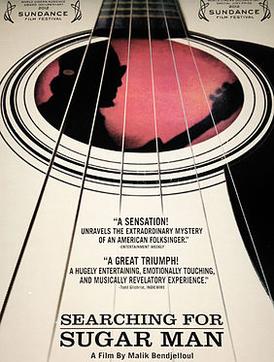
Searching for Sugar Man is a 2012 documentary film about a South African cultural phenomenon, written and directed by Malik Bendjelloul, which details the efforts in the late 1990s of two Cape Town fans, Stephen "Sugar" Segerman and Craig Bartholomew Strydom, to find out whether the rumoured death of American musician Sixto Rodriguez was true and, if not, to discover what had become of him. Rodriguez's music, which had never achieved success in his home country of the United States, had become very popular in South Africa, although little was known about him there.
Transforming Stories International Christian Film Festival (TSICFF) is an annual Christian film industry film festival held in South Africa. The festival is funded by Humble Pie Entertainment. In 2010, the festival's inaugural year, the award ceremony took place in Johannesburg, South Africa. Screenings took place in five different cities across the country. 18 countries submitted a total of 108 films, 12 of which were chosen as semi-finalists from which 5 became finalists. Awards were presented for Best Feature Film, Best Documentary Film, and Best Short Film. Greg Laurie's Lost Boy: The Next Chapter won the Best Documentary Film Award. In 2011, 19 countries participated, submitting a total of 190 films. Ryley Grunenwald's The Dawn of a New Day was named Best Documentary.

African heavy metal refers to the heavy metal music scene in Africa, particularly in East African countries such as Kenya and Uganda, and Southern African countries including Namibia, Madagascar, Angola, Botswana, South Africa, Mozambique, and Zimbabwe. It also extends into North African nations such as Algeria, Egypt, Libya, Morocco, and Tunisia, although bands in the North African region associate themselves more closely with the MENA region in terms of cultural and social consistencies. African heavy metal is characterized by the use of European and American metal genres, usually blended with traditional African instruments and musical styles, creating distinct regional differences.
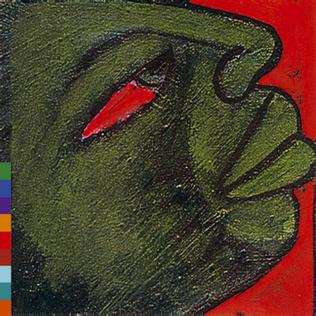
Marjurugenta is the debut album by Mozambican marrabenta band Ghorwane, recorded in August 1991 at Real World Studios but not released until September 1993 by Real World Records. The band had built up a reputation in their native country throughout the 1980s for their unique urban dance musical style and politically conscious lyrics, pulling from genres such as marrabenta and xigubu. After being denied visas to play at a European festival in 1987, it soon became possible for the band to play the world music-celebrating WOMAD festival in 1990. While on their trip to the festival, the band were approached by the WOMAD-affiliated Real World Records to record their debut album.
Punk in Africa, is a 2012 multilingual African documentary historical punk music film co-directed by Deon Maas and Keith Jones and co-produced by director himself with Jefe Brown. The film stars Ivan Kadey, Paulo Chibanga, Lee Thomson, and Warwick Sony. The film revolves around the story of the multiracial punk movement within the political and social upheavals experienced in three Southern African countries: South Africa, Mozambique and Zimbabwe.








